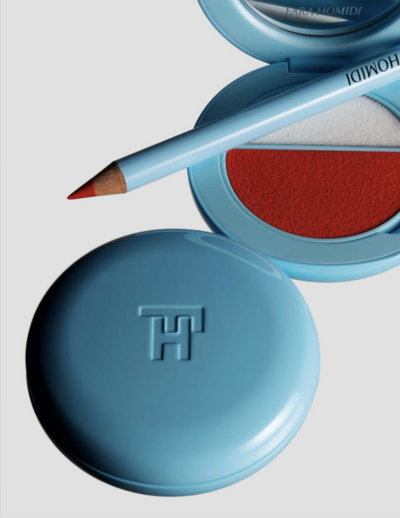Make-up artist Fara Homidi and model Paloma Elsesser discuss life as an underdog and what makes a brand.
Interview by Tish Weinstock.
Photograph by Robin Broadbent.

Make-up artist Fara Homidi and model Paloma Elsesser discuss life as an underdog and what makes a brand.
Paloma Elsesser is the face that launched Pat McGrath Labs, Glossier, Fenty Beauty, and Fenty Skin. When a brand is looking to signal a departure from tradition, it calls upon the 31-year-old model. That’s not just down to her face, but rather what Elsesser represents: an idea of individual beauty that transcends size, shape and skin colour. When it came to Fara Homidi launching her eponymous beauty brand earlier this year – a collection of clean, luxury lip products – there was nobody else she wanted to front her inaugural campaign. But there was another reason for this choice. It’s a face that Homidi knows intimately having been doing the model’s make-up for the past eight years. Where other brands pick ambassadors on the basis of their fame, choosing Elsesser to represent hers was about friendship, community, and shared experience. Both know what it feels like to be othered. Homidi was an indie kid who shopped in thrift stores and listened to rock music while growing up in a small Afghan community in Fremont, California, while Elsesser, who is of African-American and Chilean-Swiss descent, was raised in a predominantly white area in Los Angeles. Both now work in an industry built on specific ideas of what models, make-up, and beauty brands should look like. In spite of this, the pair have been able to carve out a space for themselves as leaders in their respective fields.
Tish Weinstock: Tell me a bit about your relationship.
Paloma Elsesser: We met eight years ago on a Nike shoot, I sat in her chair and she put this really dark ochre lip on me, and I was like, ‘This bitch gets me.’
Fara Homidi: We speak the same language. We both like excellence, but that doesn’t mean perfection. I like being pushed to rise to the occasion and I feel safe with Paloma when she pushes me there.
Is feeling safe a rarity in this industry?
Paloma: It becomes very difficult and painful to relate to an industry that once made me think they cared about change. There is part of the industry that genuinely does, but there is a huge majority that doesn’t.
Fara: Paloma has created her own path. It’s that idea of the underdog I can relate to.
What inspired the launch in the first place?
Fara: There was never a luxury beauty brand that existed in the fashion space that my friends and I could relate to. I don’t know why we are not doing cosmetics that are speaking to that fashion crowd. Though some fashion brands do beauty, something becomes diluted. There’s a certain level of quality and expertise to the clothing. But with the cosmetics, yes, there is something “luxury” about them, but it’s not at the same level. The beauty campaigns are also more commercial, whereas the clothing campaigns are shot by edgier photographers. I wanted to create something that felt special and didn’t compromise on quality. Everything is custom-made: custom formulations, custom packaging. I would be lying if I say I don’t want it to be a household name and in all the girlies’ bags. I think that will happen, I really believe in it. But even if this ended tomorrow, I would still be beyond proud of it.
What is the significance of the blue packaging?
Fara: I am all about optimism and this colour embodied all of that. I feel like all the possibilities are available to me if it’s a sunny day, and the place I feel most grounded is the ocean.
You launched with lip products, what’s next?
Fara: It’s a complexion product that I think is groundbreaking. I just got a DM from a model who was like, ‘Everytime you’re on set
I don’t have to bring my complexion products. I know that you will match me. I am grateful.’ That is so powerful but also so sad that someone had to say that to me. Complexion is a big thing to me. It was a no-brainer that this collection would be complexion-considerate from its inception.
Paloma you’ve been a part of several beauty launches, what do you make of that?
Paloma: I feel really lucky to have been part of their DNA.
Do you think of yourself as a brand?
Paloma: Only as recently as my book launch. It made me think of myself as an entity that people want to be a part of. I was so moved that so many people showed up. When I die I can say at least I existed as something to make people think, consider, critique or just be.
Where is beauty heading?
Paloma: People are becoming more pulled back. But I think we should be investigating what pulled back means, because oftentimes sophistication and chicness is exclusive to thin white people. There’s this idea that representation needs to be about armpit hair, glitter, colour and all this stuff, all the time, which is fundamentally not chic. Whereas thinness and whiteness is clean and simple and right. I would like to see these worlds blended.
Fara: To piggyback on what Paloma is saying, I want to be chic too, I want to buy something that makes me feel like I belong in that ‘you can sit with us’ club of what chicness is.